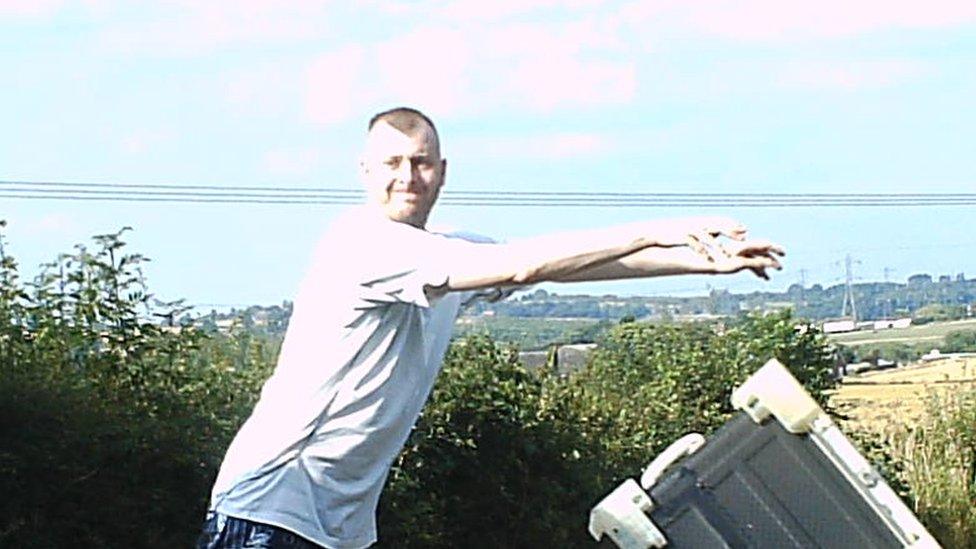Rubbish job: Why don't we just pick up litter?
- Published
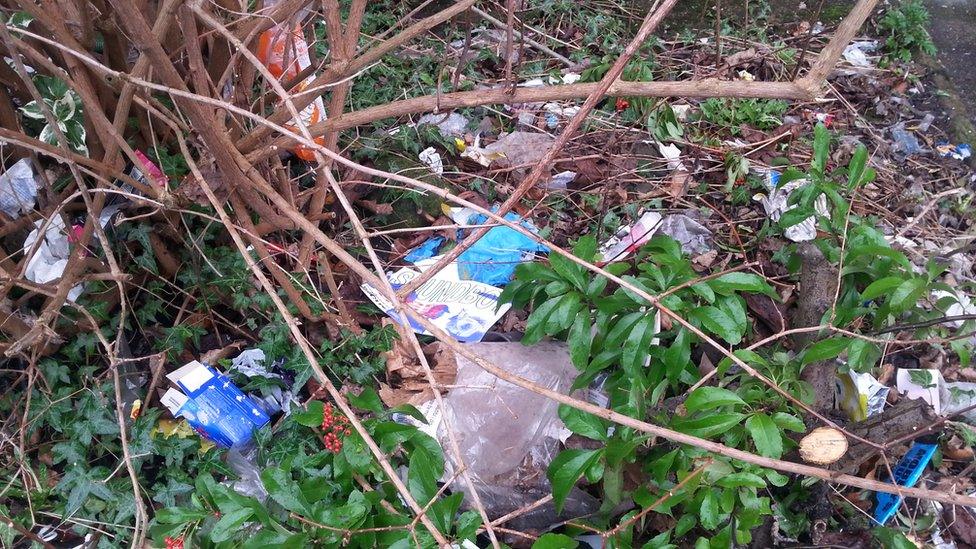
Does this make you tut and roll your eyes or itch to pick it up and put it in a bin?
We threaten litter louts with fines and demand councils install extra bins and clean the streets more often. But what if, instead, every person who saw a discarded crisp bag, can or cigarette packet just picked it up? Would that be the end of the world?
American writer and humorist David Sedaris admits to being "obsessed" with picking up rubbish - sometimes for whole afternoons at a time.
He does it so much the council in Horsham, West Sussex, where he now lives, has named a refuse truck after him, external.
"People will pull their children close when I pass," he laughs.
His litter-picking exploits make entertaining radio and, in January last year, led to him being invited before a parliamentary select committee to give evidence.
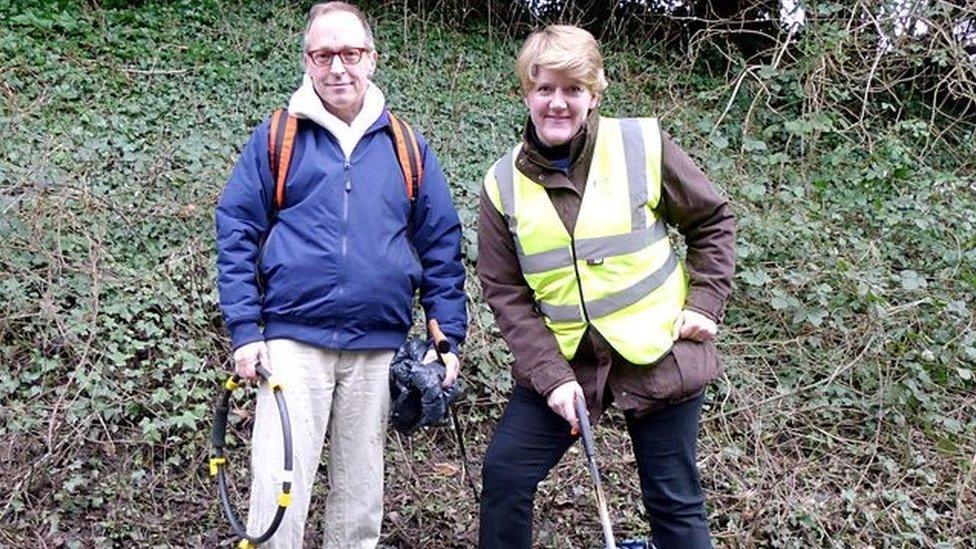
"No-one should have to live in a teenager's bedroom - it's bad for your spirit," Sedaris told select committee MPs, a couple of years after taking presenter Clare Balding litter picking
Sedaris told MPs he had once walked past a house with so much rubbish in its front yard he thought it was abandoned.
"So, I pick it up and then this woman comes from behind a hedge and said, 'What are you doing?'," he said.
"I said, I'm picking up your rubbish.
"'Thank God,' she said, 'I was going to call the council'.
"I see this all the time - people won't do anything to help," he said. "Their attitude is, 'I didn't drop it, why would I pick it up?'"

Getting your hands dirty - when would you pick up?

A small and unscientific sampling of people gleaned the insight that the fear a dog may have urinated on the litter was a significant deterrent.
Dirty litter, too, was a less attractive proposition, even for the community minded.
Some admitted to picking up more litter on their own street than others.
The proximity of a bin was also a deciding factor with "I'm not carting around somebody's rubbish for 300 yards" offered as a consideration.
One litter vigilante used to challenge culprits but he stopped, he says, when he was threatened with violence.

Maybe it is easier to ignore than address - unless something forces you to reconsider your approach. Like a three-year-old, for example.
Matilda Rusby sparked a mass local clean-up in her hometown of North Shields after her mother tweeted pictures of her picking up litter.
People who had walked past the same rubbish were inspired - or embarrassed - into doing something about it themselves.
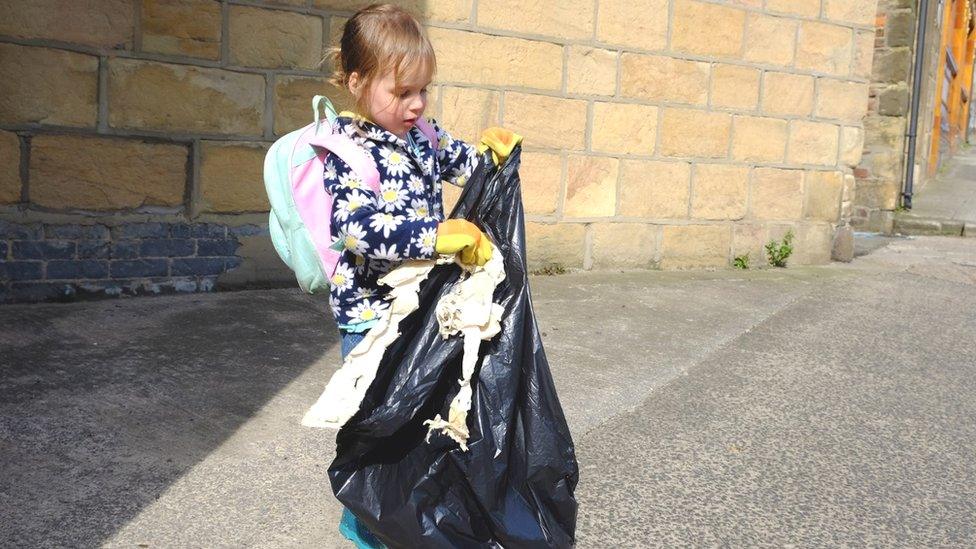
Matilda Rusby's mother, Frankie, said: "Why should my three-year-old have to do this? If she knows better why don't others?"
If a best-selling, award-winning author and a little girl can pick up other people's rubbish, why can't the rest of us?
Former councillor David Hardman has always "gone round picking up litter" wherever he goes, "much to the annoyance" of his family.
He would fill a black bin bag every day, walking his daughter to school. "Everywhere I went I had to wash my hands because I'd picked up something horrible," he says.
Discovering hand-held litter grabbers "revolutionised" his activities.
In Jesmond, the suburb of Newcastle where he lives, "quite a few people" make concerted efforts to deal with rubbish but some residents, he says, "are completely oblivious to it".
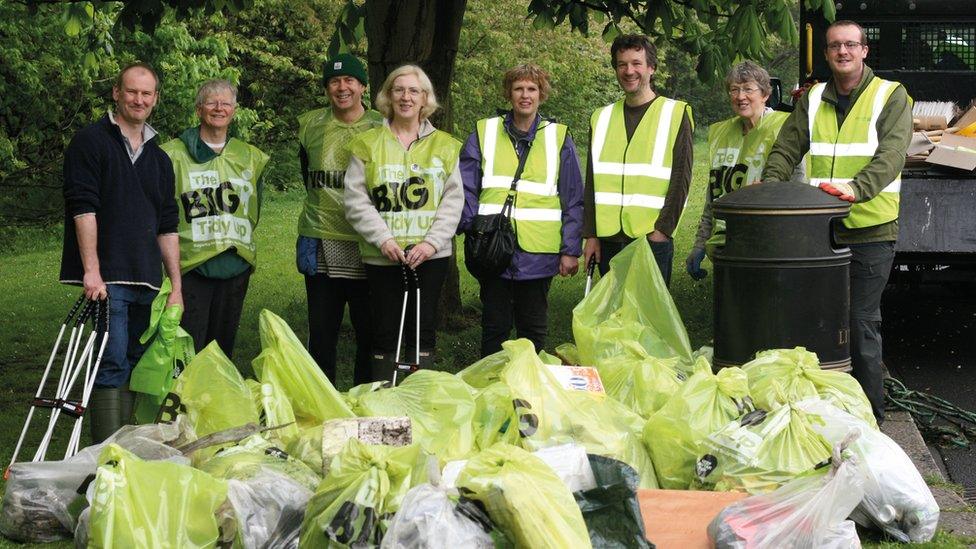
David Hardman (third right) spends a lot of time organising and taking part in litter picks
Dr Joan Harvey, a chartered psychologist at Newcastle University, believes there is a "group effect" at play here.
"If somebody else starts picking up litter, you'll start picking up litter - if nobody does and they all walk past it, you'll walk past it," she says.
Since 80-90% of us are followers, we need someone to take the lead, she says.
"Once somebody starts to do something, others start to do it."
According to the "bystander effect, external" theory, not only are we reluctant to be the first to act but, the greater the number of people not doing something, the more we feel we do not have to either.
Some also say it is the council's job anyway, though Dr Harvey suggests this "excuse" can be an example of "post hoc attribution".
We walk past the litter and "look afterwards for reasons why... whether they're true or not", she says.
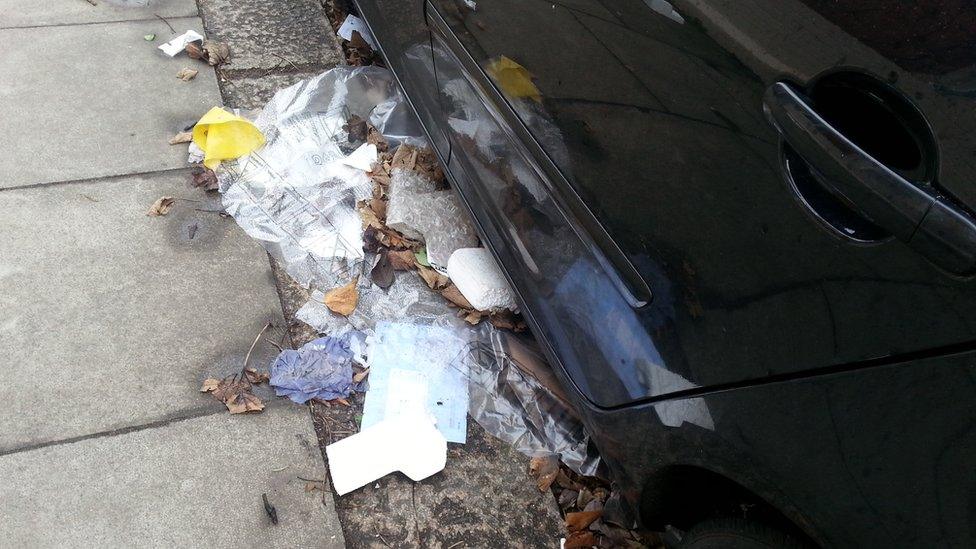
Did the driver of this car rationalise why he or she did not pick up this rubbish?
In Newcastle's German twin city of Gelsenkirchen it is generally the other way around, says the German Honorary Consul for the North East and Cumbria.
"In general Germans feel responsible for looking after pathways themselves, not the council," Jo Chexal says.
"I have seen people in Germany pick up litter which someone has dropped and go up to them and say politely that they think they have dropped something and give it back to them.
"It is about pride in the city and its surroundings and not leaving the responsibility with someone else [or] the council."
In some parts of Germany official requirement backs up natural inclination, with shops forced to keep their frontages clear and residents required to clean their own streets.
Mr Hardman has argued unsuccessfully for such rules to be adopted in Newcastle.
"It requires a change of national legislation which there doesn't seem to be any appetite for," he says.
But Germany has another trick up its sleeve. There you can still return empty bottles and cans to shops in return for the "pfand", or deposit.
This incentive to pick up - or not drop - was consigned to UK history when drinks producer Barr announced it would no longer be paying 30p for returned bottles.
Like Matilda Rusby, children were once the answer, at least where bottles were concerned, as the BBC political correspondent Nick Eardley's tale of youthful bottle collecting shows.
He would turn up at his local Edinburgh newsagent's with as many empty pop bottles as he could find.
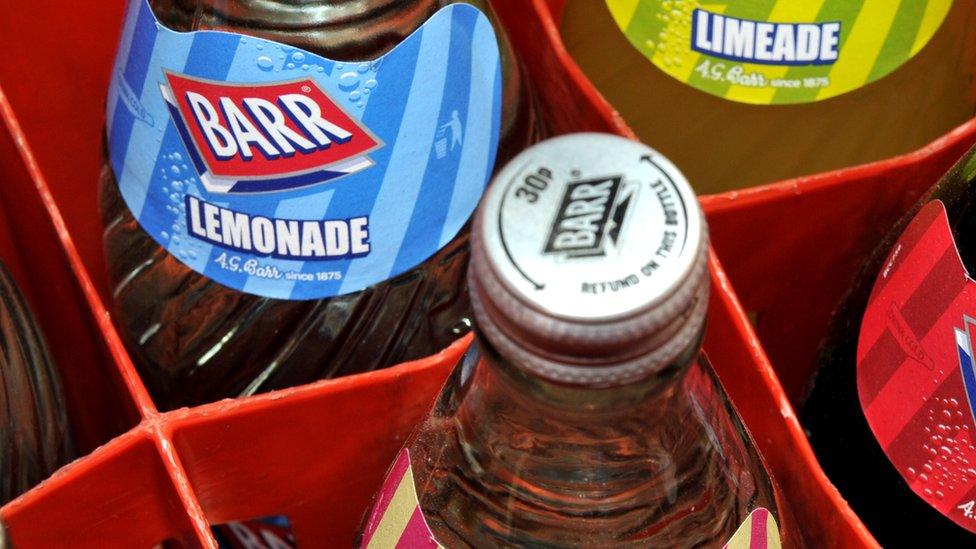
If you have a stash of these in your kitchen it is too late to take them back for the 30p
"The bottles would come from a variety of sources - my dad, neighbours, the park where teenagers used to drink on a Friday and Saturday night," he said.
Roll forward a few decades and sometimes modern rules make it hard to be a Good Litter Samaritan.
Colin Shadbolt from Faversham in Kent reportedly spent a day picking up litter only to be told he could not leave it at his local tip, external because it was not his rubbish.
Kent County Council said it "applauded the initiative" but the potential for waste to be hazardous meant it must make sure it was "disposed of in the most appropriate way".
It advised litter pickers to contact the council beforehand.
And there is another problem.
"There is a limit to how much the council can afford to put into landfill or through its system," Mr Hardman says.
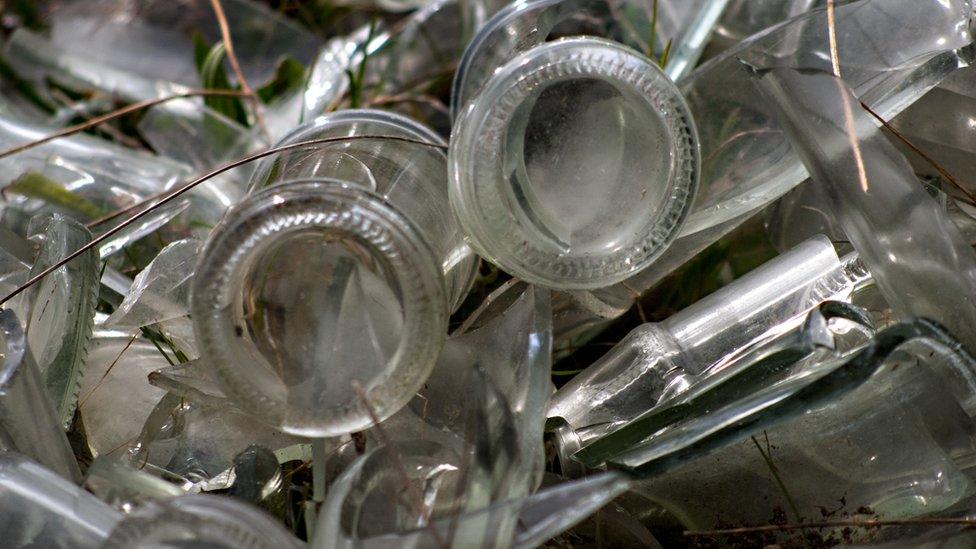
Once upon a time you would have got a few bob for this lot
"The more weight it puts through its system, even though a lot of it is recycled, they pay."
So, if every person in Newcastle suddenly became very community-minded and started picking up every piece of rubbish they saw and put it into the nearest bin, would the council have a problem?
The council would only say it welcomed the "involvement of organised groups in keeping their neighbourhoods tidy".
There have been efforts over the years to encourage people not to drop litter, though the Keep Britain Tidy campaign to persuade people to Clean for the Queen was not entirely well received.
Why, people asked, should they do what they pay their council to do.
But, as local authorities facing budget cuts make choices between departments and reduce street cleaning budgets by millions, some would argue it is churlish to step over litter and say it is someone else's job to pick it up.
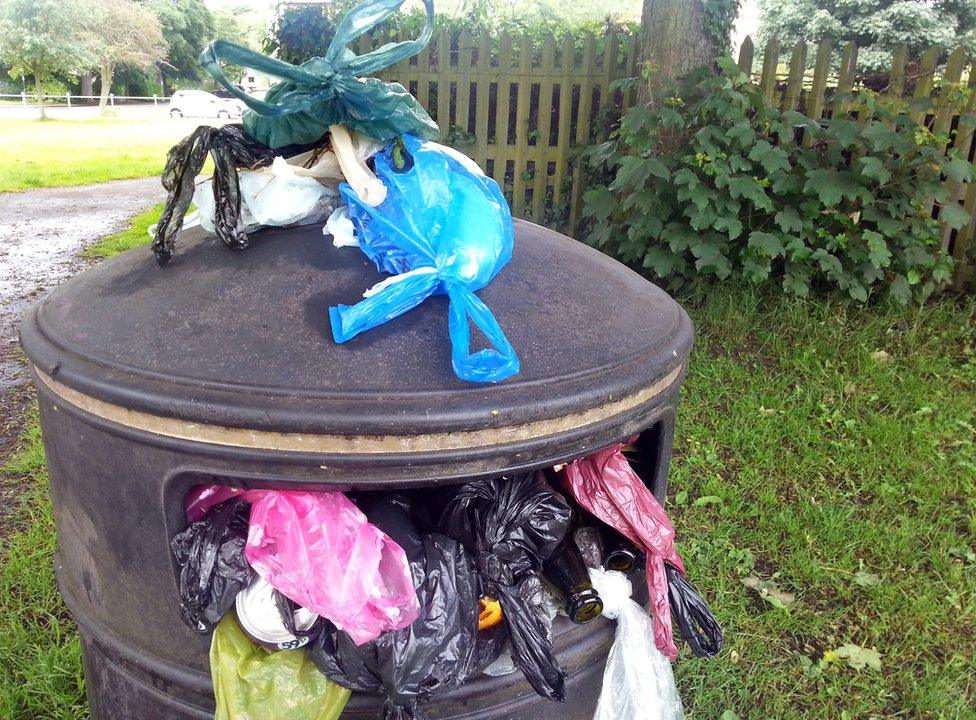
Who's responsible for this - the council or the dog walkers who don't take their poo bags home?
Keep Britain Tidy points out that Clean for the Queen was the first national litter-picking campaign for 10 years.
Chief executive Allison Ogden-Newton said it had "been quite a while, really, since the message about anti-littering has got out there to any audience".
Maybe we need Dr Harvey's "group response", then the solo pickers will not have to worry about being looked at sideways.
David Hardman says he takes "the mick out of" himself for constantly collecting litter because otherwise "people do think you are weird".
But is that fair? David Sedaris thinks not.
"How is it fair that the person who rips a lottery ticket into 16 pieces and throws it on the ground isn't crazy, but the guy who picks it up is?"
- Published8 May 2016
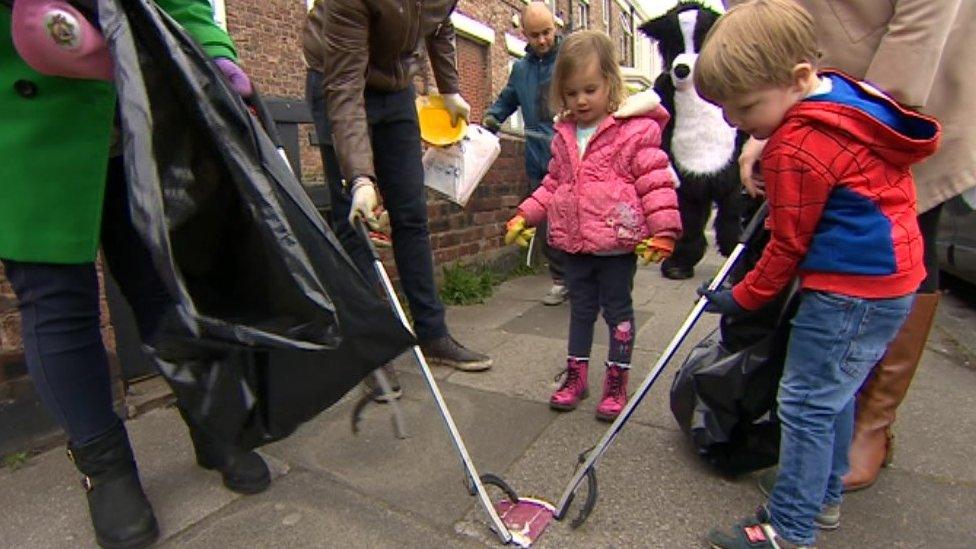
- Published2 May 2016
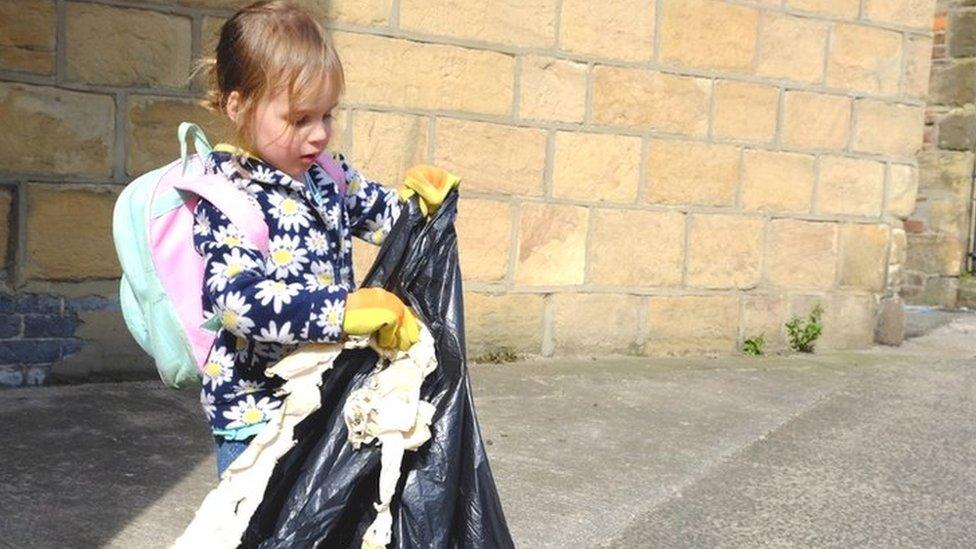
- Published19 August 2015
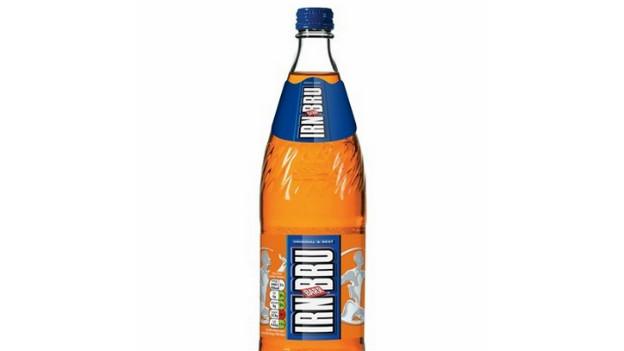
- Published27 September 2015
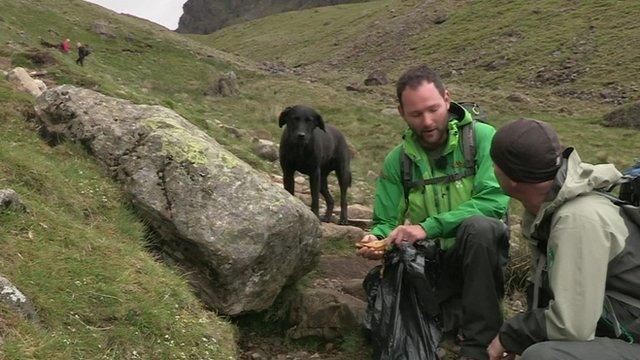
- Published15 April 2016
